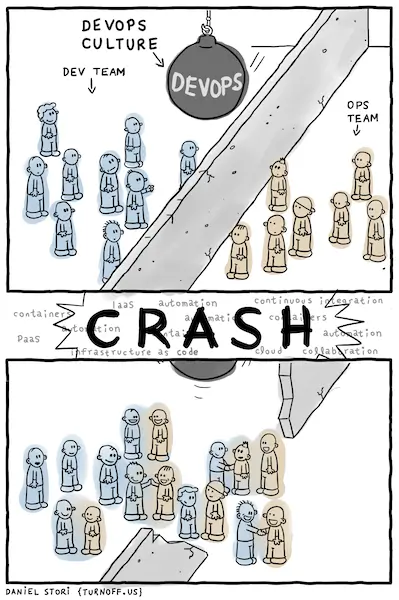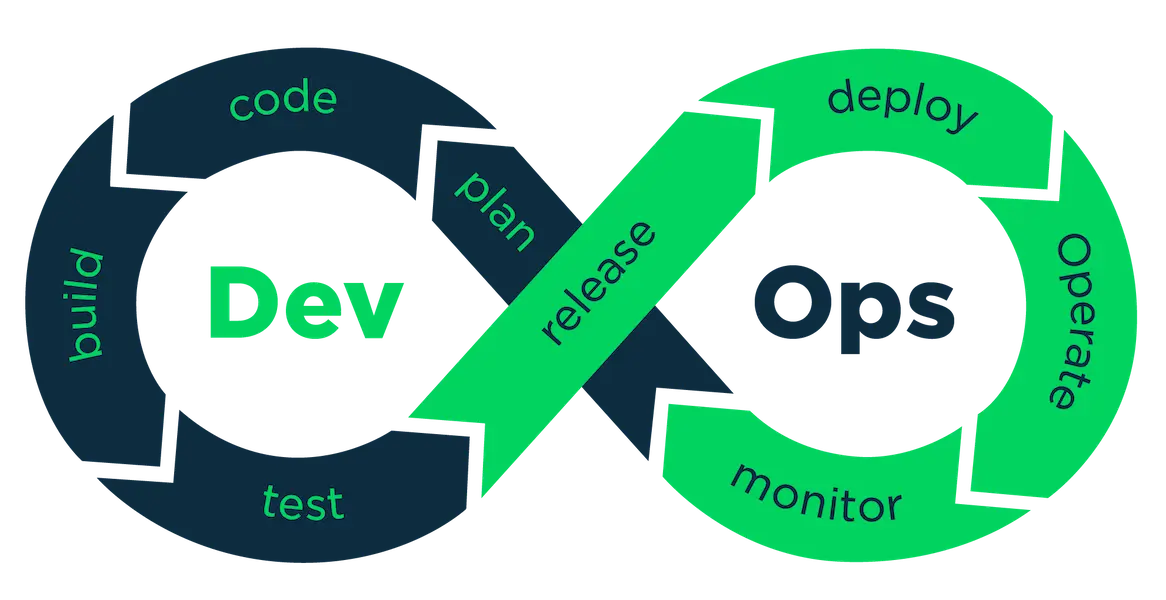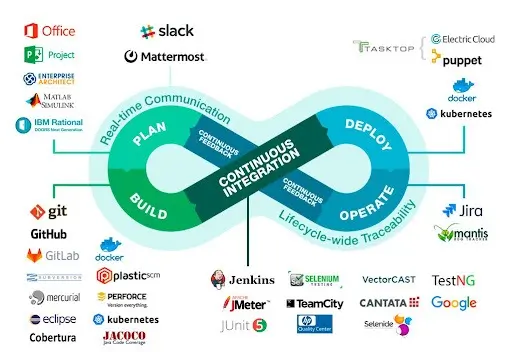Did you know that up until roughly 2007 or 2008, software teams didn’t necessarily deploy and maintain the code they produced?
A different team, IT operations, was responsible. Unsurprisingly, this led to a lot of back-and-forth. So what is a DevOps engineer and where do they come in?
There was a general malaise about the arrangement, even though there was nothing exactly wrong with it. The two teams, therefore, decided to embark on a mission to figure out what was wrong.
Very soon, it became clear—they not only had different and competing goals but also disparate leaders and sometimes worked in separate physical spaces.
Thanks to the efforts of Patrick Debois, Gene Kim, and John Willis that began around 15 years ago, DevOps and consequently the role of DevOps engineer was born.
In this article, we explore the world of DevOps—what it is, how it works, and how you can become a DevOps engineer.
- What is DevOps?
- What is a DevOps engineer?
- How to become a DevOps engineer from scratch
- DevOps engineer FAQs:
- Final thoughts
1. What is DevOps?
There isn’t one single, complete, or correct definition of DevOps. This is because DevOps has several facets.
It is a philosophy, a culture, a methodology, a set of practices, a career, and sometimes it can refer to a collection of tools.
The most critical function of DevOps is to bridge the two aforementioned teams: development and operations.

In this way, the development crew will take into account how the application runs after deployment even as they build the software.
The operations team, on the other hand, is aware of how the software is developed, including the technologies used, which aids them in picking and developing the systems on which the software runs.
As a result, the teams release even better-quality software faster. Also, there’s better communication flow, shared responsibility, transparency, and prompt feedback.
Additional advantages of incorporating DevOps into your software development life cycle (SDLC) include:
- Improved collaboration
- Increased efficiency
- Faster time to market
- More frequent releases
- Prioritization of user needs
- Reduced time spent on fixes
- Reduced failure rates of new releases
- Reduced mean time to recovery (MTTR). MTTR is the time it takes to recover from a system failure.
DevOps as a process is an infinite loop (see the following image).

The loop consists of steps like planning, coding, building, testing, code release, deployment, operations, and monitoring.
The entire SDLC, therefore, integrates aspects of both development and operations.
DevOps is characterized by concepts like:
- continuous integration
- continuous delivery
- continuous deployment
- continuous feedback
- continuous monitoring
- continuous provisioning
- configuration management
- agile practices
Technologies used in DevOps include cloud computing, containerization, and microservices.
DevOps also uses a set of tools and platforms to help automate processes, making the SDLC faster and more efficient.
These tools are referred to as a “DevOps platform.” For the platform to truly function within DevOps, all these tools and platforms need to be integrated.
Some of them are shown in the following image.

In some companies, DevOps comprises a single team that’s responsible for the entire SDLC. This team could also include quality assurance and security.
If the team is also responsible for the security of the system that’s being built, then the entire team will be known as DevSecOps.
Some organizations believe that DevOps should encompass business and therefore have BizDevOps.
DevOps has been quite successful. A survey of over 500 professionals done by Atlassian and CITE Research reported that 90% of organizations that used DevOps saw a direct impact on their business metrics.
As a result of this success, businesses are expanding DevOps all across the board, beyond development and IT operations, in a concept known as DevOps 2.0.
DevOps 2.0’s main objective is to break down silos and create collaboration among technical and non-technical members of an organization that are involved in the SDLC. It’s already happening in the C-suite.
2. What is a DevOps engineer?
Essentially, a DevOps engineer builds the systems that make DevOps possible. They’re knowledgeable about the software development life cycle and help automate processes such as deployment. They’re also responsible for ensuring that the SDLC remains efficient.
With 99% of the respondents to Atlassian’s 2020 DevOps Trends Survey saying that DevOps has positively impacted their organization, it’s no wonder that companies are looking to implement DevOps.
This means that there’s a high demand for DevOps practitioners. On LinkedIn Jobs, there are currently over 20,000 open positions for the role in the U.S. alone!
What does a DevOps engineer do?
On top of those mentioned above, other DevOps engineer tasks include:
- Infrastructure monitoring
- Building, maintaining, and managing CI/CD pipelines
- Automating manual, repetitive, and time-consuming tasks
- Testing code and deployments to find ways to make them more efficient and error-free
- Maintaining the production environment ensuring that it works reliably
- Creating platforms and infrastructure for development teams to host their applications
- Project planning so as to understand system options, and do a cost-benefit analysis
DevOps engineer skills
A DevOps engineer requires a wide skillset, for example:
- API knowledge
- Infrastructure
- Version control
- Monitoring and alerting
- Infrastructure as Code (IaC)
- Scaling applications with heavy traffic loads
- Working knowledge of the Unix or Linux command line
- Code quality analysis and tools around it such as SonarQube
- Configuration management and tools like Ansible and Progress Chef
- Programming language skills (Python, JavaScript, Ruby, or Golang)
- Container building and orchestration, and tools around it like Docker
- Application deployment methods (container deployment, lambda functions)
- Continuous integration and continuous deployment (CI/CD) and their tools, for example Jenkins or Atlassian Bamboo
- Testing, Test Driven Development (TDD) and tools used in testing, for example, JUnit and Selenium
- Virtual machine and cloud provisioning and setup on cloud provider platforms like Azure, Google Cloud, and AWS
In addition, you need to have good soft skills. This is because you’ll be talking with various people, from the users of the software you’re building to developers and sometimes customers. This way, you’re able to build systems that meet their specific needs.
Some companies further subdivide the DevOps engineer job into the following roles:
- Release Manager
- DevOps Automation Expert
- DevOps Testing Professional
Some of the DevOps skills we’ve listed may be performed by other roles. For instance, a system administrator might be responsible for configuration management.
Therefore, the responsibilities of a DevOps engineer vary depending on the organization.
3. How to become a DevOps engineer from scratch
The learning curve for becoming a DevOps engineer isn’t easy. It is, however, doable with lots of determination and focus.
Let’s break down the main steps that you need to take to follow this career path.
Step One: Get the necessary education
As a DevOps engineer, you need some programming knowledge as you’ll be writing code when building infrastructure and automating tasks.
For starters, you can check out the CareerFoundry Full-Stack Web Development Program, which is a flexible fully mentored programming curriculum designed to give you a thorough understanding of how to work in development.
Once you know how to code, you should focus on other important parts of DevOps, like CI/CD tools, infrastructure tools, containerization, as well as cloud computing platforms.
Get IT certifications—for example, AWS certifications—and do DevOps courses too.
Focus on only the tools that you find relevant and on one cloud computing platform. AWS is the most popular, so you want to start here.
If you can find some DevOps books too, then you can really understand the area and its role in the SDLC.
Step Two: Practice, practice, practice
After you’ve acquired substantial DevOps knowledge, it’s time to start practicing. You can begin by building an application and sharing it on GitHub, GitLab, or any other repository of your choice.
Next, add CI to the project. This will test the integration of new code.
After ensuring that your tests pass, deploy your app. You can deploy via a container or lambda function. You can even attempt to deploy via infrastructure as code.
Add other DevOps aspects like monitoring and attempt to show that you can scale the app based on usage, traffic, and CPU usage.
You can add an API gateway, a database, and services that call each other, and even improve your tests.
Step Three: Showcase your work
Instead of telling people how you can be a DevOps engineer, why not show them? If you haven’t already, build a website or portfolio to showcase your work. You can then share it on social platforms and on LinkedIn, as well as add it to your resume.
Better still, write a comprehensive blog post about it and share it on as many platforms as you can. You never know who’ll come across it.
Step four: Network
Start to connect with people in the industry and entrepreneurs who might be looking for DevOps practitioners.
You can do so by joining online communities on Discord, Slack, and Tech Twitter. Particular platforms also have community forums in which you can join, learn from others, contribute, and connect.
You can also attend webinars and events both online and in person.
Step five: The job search
Armed with your resume, portfolio, and good soft skills, you’re ready to begin your DevOps engineer job search. You can look for companies hiring entry-level DevOps engineers, apprenticeships, and even paid internships.
At this point, all you need to do is “get your foot through the door.” You can then grow from whatever initial DevOps role you get.
4. DevOps engineer FAQs
In this section, we answer important questions you may still have about DevOps engineers.
What’s the average DevOps engineer salary?
According to the 2023 Stack Overflow Developer Survey, DevOps specialists reported an average annual salary is $80,158.
Glassdoor lists a DevOps engineer’s salary as $134,838 annually on average in the United States, £50,784 per year in the UK, and $93,981 CA in Canada.
Do DevOps engineers do coding?
Yes, DevOps engineers code. They need the code to build the infrastructure on which DevOps runs as well as to automate DevOps processes and build CI/CD pipelines.
Is DevOps engineering a good career?
Yes, if you enjoy improving how systems work and making them more efficient. In terms of compensation, DevOps engineers are also paid more.
What is the DevOps career path?
The DevOps career path often begins with a software engineering background. After a bit of experience with software development or system administration, you can transition into DevOps.
You need to understand core DevOps concepts like infrastructure management, CI/CD, containerization, and cloud computing. Eventually, you can become a senior or lead DevOps engineer, depending on how your company or organization is structured.
5. Wrap-up
We’ve traversed the land of DevOps and discovered who a DevOps engineer is, what exactly is DevOps, learned how to work in this area, and answered some DevOps questions you could have had.
We hope you’re now ready to venture into the world of DevOps. All you need is patience, focus, and determination. Eventually, you’ll be well on your way to automating systems and adding to the DevOps culture in a business or organization. If you’d like to
If you’d like to read more about the world of development in general, then check out these guides:
